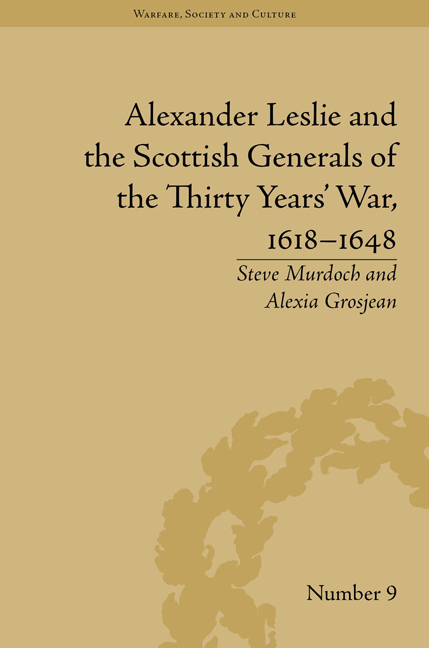Book contents
- Frontmatter
- CONTENTS
- Dedication
- Acknowledgements
- Abbreviations
- Stylistic Conventions
- Introduction
- 1 Scotland's Indigenous Military Cultures
- 2 The Scottish Military Diaspora
- 3 The Thirty Years' War Campaigns: Stralsund to Prague, 1628–35
- 4 Alexander Leslie and the Army of the Weser, 1635–9
- 5 The Home Front: Leslie, Ruthven and the Bishops' Wars, 1638–41
- 6 The Scottish ‘Veteran Generals’ in England, 1642–7
- 7 Going Full Circle: The New Scottish Command in Europe, 1639–48
- Conclusion
- Appendix
- Notes
- Works Cited
- Index
Conclusion
- Frontmatter
- CONTENTS
- Dedication
- Acknowledgements
- Abbreviations
- Stylistic Conventions
- Introduction
- 1 Scotland's Indigenous Military Cultures
- 2 The Scottish Military Diaspora
- 3 The Thirty Years' War Campaigns: Stralsund to Prague, 1628–35
- 4 Alexander Leslie and the Army of the Weser, 1635–9
- 5 The Home Front: Leslie, Ruthven and the Bishops' Wars, 1638–41
- 6 The Scottish ‘Veteran Generals’ in England, 1642–7
- 7 Going Full Circle: The New Scottish Command in Europe, 1639–48
- Conclusion
- Appendix
- Notes
- Works Cited
- Index
Summary
Field Marshal Alexander Leslie has previously been the focus of a few studies, each of which has provided only glimpses into all but his most famous campaigns in Britain in the 1640s. Ever since C. S. Terry penned his well-known biography, it was thought there could be little more to be learned about the soldier, particularly regarding his role in the British Civil Wars. This study, nevertheless, made a number of new discoveries and corrected historical errors with regard to his service in both continental Europe and Great Britain. Not least among these additions is the thorough investigation of his role as a siege warfare tactician both in a defensive role (Stralsund, 1628) and as an assault commander (Newcastle, 1644). Equally, his tactical awareness, troop deployment and unswerving commitment during his major pitched-battle victories at Wittstock (1636) and Marston Moor (1644) have been fully contextualized – in the latter case completely rewriting our understanding of the battle and not just Leslie's role within it. When added to his proven abilities as a skirmisher, a logistics expert and an accomplished councillor, the comprehensive nature of his skills in the art of war are fully realized. Moreover, Alexander Leslie proved to be a man who could interact across the social strata, was able to comprehend and adapt to a variety of military and cultural circumstances, and ultimately commanded the respect of monarchs, nobles, soldiers and civilians alike, albeit sometimes grudgingly.
- Type
- Chapter
- Information
- Publisher: Pickering & ChattoFirst published in: 2014

